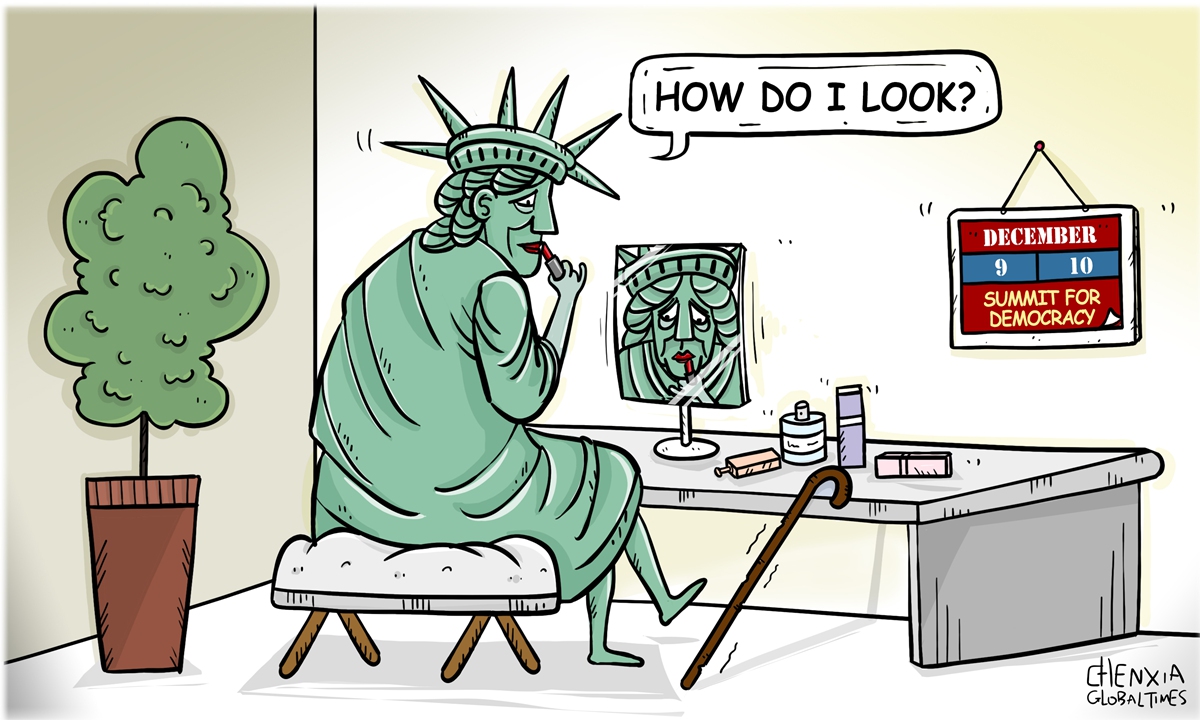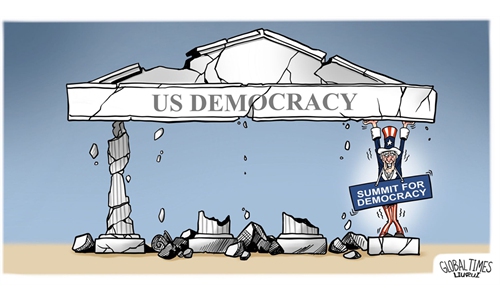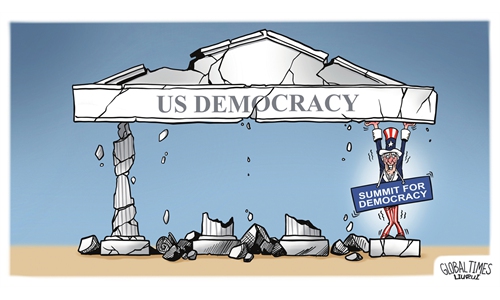Doubts, sneers on US ‘democracy summit’ continue to mount as empty talk leads nowhere

The coldness and sneers the summit faces demonstrated the US' failure to unite ideological allies and partners as the international community believes the US can neither clean up its domestic mess or bring good to the world, experts said, noting the ambition of gathering one year later to update the democratic progress participants make shows the summit itself cannot escape empty talk and US geopolitical calculations.
US President Joe Biden on Thursday gave a speech opening the virtual summit, which is part of his election campaign promises and consistent with the president's habitual play of the ideology card to supporters while alienating those opposed. "To strengthen our own democracies and push back on authoritarianism," the president said amid mounting doubts on the US criteria for attendance, as EU member Hungary and Singapore were not among the invitees.
Even the New York Times had to admit that US democracy has hit a difficult patch. And while Biden administration may have viewed the promotion of democracy as an easy way to firm up alliances and partnerships, the event has become "a focus of criticism from around the world" and from domestic activists "concerned about the fissures within America's own democratic system," to circumvent mentioning the US Capitol riot.
More American media outlets including the Washington Post, PBS and NPR have published articles which doubted what the summit can generate to the US and the world.
Karen Attiah, a columnist for the Washington Post, tweeted on Thursday that on the eve of Biden's democracy summit, the administration wants to sell more weapons to governments that crush dissidents, citing US arms sales to Saudi Arabia.
Opposition has also come from the home of attendees as Indian media were dismayed that their Prime Minister Narendra Modi was advised to attend the US-proposed summit and reminded Indian authorities to be wary of the US playing tricks behind the summit.
Modi is "lending legitimacy to American global arrogance" by attending the "massive talkathon," The Wire reported. The Tribune said "the biggest question mark [for democracy] is before the host country, the US itself."
Indian netizens also questioned the need to attend the gathering, asking "What is the purpose of this forum? Will the life of at least one person change according to its results? Will hunger end in Afghanistan?"
Though some European leaders were invited to the closed-door session of the democracy summit, Europe-based media overall did not give a high-profile coverage. Among the reports, most point out the US democracy crisis.
Deutsche Welle said the Biden administration has a steep hill to climb and lots to learn considering the recent challenges to democracy at home. Like much of global coverage of the summit, the deadly attack of the US Capitol was cited in this report.
The news outlet quoted James Lamond, director of the Democratic Resilience Program at the Center for European Policy Analysis, as raising two questions to assess the outcome of the summit: Will countries and participants come up with specific commitments? And are these commitments meaningful?
Sun Chenghao, adjunct fellow at the Center for International Security and Strategy of Tsinghua University, told the Global Times it is hard for the summit to yield any productive outcomes as it is nothing but a political show for the US to taunt its "democracy." However, it's bad timing given the US' disastrous dealing with the pandemic, mounting doubts on its democratic system domestically and total failure in promoting US-style democracy overseas in Afghanistan, Iraq and other countries.
The $424 billion funding was one of very few concrete announcements at the summit, if it can be granted properly through US administrative procedures.
Sun said that at a time of inherent crisis, the only thing that the US can do to promote "democracy" is to pour money to nongovernmental organizations globally. However, money is always distributed with additional conditions and some of them is used to foster color revolutions.
Biden called on countries to lock arms and reaffirm a shared commitment, and said the summit participants will meet again next year to report progress on their commitments.
But experts sniffed at the plan as for the already vague discussions at the summit can hardly yield any results. A one-year monitoring is a waste of time and a long-term undertaking will be nothing but an illusion.


